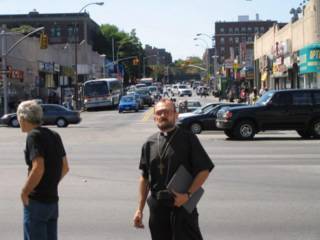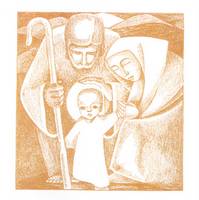 This Paschal Bright Week I'd like to share this still-smoldering Lenten Talk with you by The Very Rev'd. Dr. Jeffrey Philip Hywel John, SCP (Society of "Catholic" Priests). His Reverence is the cleric who became the first openly gay and partnered Anglican priest to be nominated in the C of E as a bishop. Shamefully, that motion was soon kicked down because of internal church politiks. (He is no relation to the British singer Elton John -- just a strong resemblance.)
This Paschal Bright Week I'd like to share this still-smoldering Lenten Talk with you by The Very Rev'd. Dr. Jeffrey Philip Hywel John, SCP (Society of "Catholic" Priests). His Reverence is the cleric who became the first openly gay and partnered Anglican priest to be nominated in the C of E as a bishop. Shamefully, that motion was soon kicked down because of internal church politiks. (He is no relation to the British singer Elton John -- just a strong resemblance.)
This Anglican Dean and canon (archpriest) just created another firestorm of controversy with his recent remarks which denied the Pauline concept of penal substitution, claiming that it 'made God a psychopath'. Although I don't subscribe to his protest-ant reformation theology (women's ordination, etc.) and "feel good Christology" I would like you to read his actual text which are powerful and inspirational words for thought -- especially since some of his flaps are being taken out of context. While Canon John speaks of Our Saviour Jesus as I know and believe in Him, he does NOT denigrate or devalue the savimg power of The Cross. These spiritual meditations which reflect Catholic doctrines could only deepen your personal relationship with Jesus.
*** Be aware that penal substitution is an ecclesiastical theory (ala Calvin/Luther) of "Vicarious Atonement" rooted in the medivevil Anselm around 1100, A.D
HE SUFFERED AND DIED FOR US!
The instinctive feeling that suffering must be a punishment sent from God seems to lie deep in the human soul -- or it does in mine anyway. In my case it may have something to do with the fact that I was brought up in a tradition of Welsh Calvinism, which took a pretty firm line on sin and retribution.
In my childhood I also had a naughty great uncle, a man who very uncalvinistically drank and smoked and swore and womanized. He died a happy man, as you might imagine, but at a rather early age, of cirrhosis of the liver. His funeral was the first time he'd been in Chapel since his wedding. But the really memorable thing was the sermon, and the gasp of disbelief as the minister took a text of appalling relevance: Psalm 55, verse 23, "Y pechadur ni chaiff fyw hanner ei ddyddiau" . . . " The sinner shall not live out half his days, for thou, Lord, shalt bring him down to the pit of destruction."
Well, you know where you are with religion like that; but belief in divine retribution isn't confined to Welsh Calvinism. Some years ago there was a small earthquake on the island of Crete, which the local bishop promptly declared was God's punishment on the Cretans for practising contraception. And it's not so many years ago that some people in the Church of England were seriously wondering whether God had personally hurled a thunderbolt at York Minster in a fit of pique at Bishop David Jenkins' consecration. It is a pleasing thought in some ways, I admit; but it does leave you with an alarming picture of God if you carry it through.
Even on a personal level we seem to have this instinct that good fortune or bad must somehow depend on how good or bad we have been. Something awful happens and what we do? We look up to heaven and say "What have I done to deserve this? -- as though divine rewards and retributions really were immediate and automatic.
Now, as it happens, there is some biblical backing for this instinct. In most of the earlier parts of the Old Testament, the bits that date before the Babylonian exile, this is precisely the way God's justice works. Sinners are struck down on the spot; Sodom is razed to the ground; whole clans are wiped out for the transgression of a single member, and the people of Israel suffer or prosper in direct proportion with their obedience or disobedience to God. At the personal level, if a man is healthy and happy it means God approves of him, he must have been behaving himself. But if he's poor, ill, luckless, childless, and subject to cirrhosis or earthquakes, then he must be a bad man, God is obviously punishing him."
The Lord preserves the way of the righteous" says the Psalmist, "But the way of the ungodly shall perish" . . . "Once I was young and now I am old" he says, "Yet I never saw the righteous man begging his bread."
I must say I've always felt, reading that, that the Psalmist really needed to get out more. Because of course it's nonsense. The theory doesn't work, and after the experience of the Exile most of the later Old Testament writers saw very plainly that it doesn't work; but it remained a persistent theory.
And of course a very convenient one, if you happen to be rich, successful and healthy, because it gives you the added bonus of knowing you're in with God as well. But if you are none of those things, then not only do you have to suffer your misfortunes, you have the added burden of knowing God doesn't like you either.
There's a much-ignored passage in Luke's Gospel that tells us very clearly what Jesus thought about this theory of retribution. The disciples come up to Jesus one day and tell Him about two recent events in the Palestinian news. In Galilee Pilate had just staged a massacre of some sectarian Jews who had been holding an illegal sacrifice; he had actually had them burned along with their offerings.
And then in Siloam, a suburb of Jerusalem, a tower block had collapsed and killed l8 people. The disciples were very excited about all this and distinctly inclined to gloat. These people had got it in the neck, so they must have deserved it; besides, they had just been to Jerusalem and Galilee with Jesus, and those people had refused to listen. So plainly they had it coming to them.
But when Jesus replies, what the disciples get is a wonderful smack in the mouth. "Do you really think the Galileans were worse than anyone else because they suffered? Or do you suppose the people in Siloam were greater sinners than anybody else?"
The fact is that throughout the New Testament the primitive theory about the relationship between justice and suffering is turned upside-down. Jesus couldn't have been clearer. Blessed are the hungry, He said, not the well-fed. Blessed are the poor, not the rich. Blessed are the sick, the miserable, the disreputable, the outcast, the down and out. They are the ones who will get their reward. If anything, a man's suffering and failure in this life are the sign of God's special blessing and care for him, not the opposite.
Come to that, how would Jesus Himself have fared by the standards of worldly success? He who was the best and most holy of men, who should have been the happiest man alive if the old theory had been correct, turned out to be a man of sorrows and acquainted with grief.
And then finally, at the end of it all, He got himself crucified. Crucifixion may or may not be the worst form of torture in the world; but it had a particular theological significance we mustn't miss. As St Paul explains, crucifixion was the method of execution which, according to the Law, was the special sign of God's ultimate punishment, His absolute curse: "Cursed be he that hangs upon a tree". On the cross, says Paul, Jesus took the place of all those who were supposed to be punished according to the Law. "God made Him into sin who knew no sin". "He became a curse for us".
But hang on -- you may well say -- what exactly does that mean -- 'Jesus took our place' ? Does it mean, then, that we are back with a punishing God after all, and that the Cross is somehow to be understood as God's ultimate punishment for sin?
That's certainly what I was told in my Calvinistic childhood. The explanation I was given went something like this: God was very angry with us for our sins, and because He is a just God, our sin had to be punished. But instead of punishing us, He sent His Son, Jesus, as a substitute to suffer and die in our place. The blood of Jesus paid the price of our sins, and because of Him God stopped being angry with us. In other words, Jesus took the rap, and we got forgiven, provided we said we believed in Him.
Well, I don't know about you, but even at the age of ten I thought this explanation was pretty repulsive as well as nonsensical. What sort of God was this, getting so angry with the world and the people He created, and then, to calm Himself down, demanding the blood of His own Son? And anyway, why should God forgive us through punishing somebody else? It was worse than illogical, it was insane. It made God sound like a psychopath. If any human being behaved like this we'd say they were a monster.
Well, I haven't changed my mind since. That explanation of the Cross just doesn't work, though sadly it's one that's still all too often preached. It just doesn't make sense to talk about a nice Jesus down here, placating the wrath of a nasty, angry Father God in heaven. Christians believe Jesus is God incarnate. As He said, 'Whoever sees Me has seen The Father'. Jesus is what God is: He is the one who shows us God's nature. And the most basic truth about God's nature is that He is Love, not wrath and punishment.
Some Christians go through their lives without grasping this. I recently came across an interview given by an elderly priest who said it wasn't till he was nearly seventy that he was finally set free from his picture of an angry God.
Fr. Robert Llewellyn was nearing retirement when he was appointed as custodian to the shrine of the 14th century mystic, Julian of Norwich. Until then he'd regularly recited the confession in the prayer book which speaks of God's "wrath and indignation against us" without a second thought. But Julian's teachings changed his life, because through her he met a God who didn't need placating. Instead he says he became "drenched in the love of God". He realized, as Julian did, that the wrath of God is no more than a human projection, and that for God to be God, He can't be less merciful and loving than the best of human beings. As Julian wrote,
"Wrath and friendship are two contraries . . . For I saw that there is no manner of wrath in God, neither for short time nor for long; -- for in sooth, if God be wroth for an instant, we should never have life nor place nor being."
The Cross, then, is not about Jesus reconciling an angry God to us; it's almost the opposite. It's about a totally loving God, incarnate in Christ, reconciling us to Him(self). On the Cross Jesus dies for our sins; the price of our sin is paid; but it is not paid to God, but by God. As St. Paul says, God was in Christ reconciling the world to Himself. Because He is Love, God does what Love does: He unites himself with the beloved. He enters His own creation and goes to the bottom line for us. Not sending a substitute to vent His punishment on, but going Himself to the bitter end, sharing in the worst of suffering and grief that life can throw at us, and finally sharing our death, so that He can bring us through death to life in Him.
There's a song by Sidney Carter which ironically sums up our misunderstanding of the Cross, in the words of the impenitent thief:
It was on a Friday morning when they took me from the cell, // And I saw they had a carpenter to crucify as well // Well: you can blame it on Pilate, you can blame it on the Jews // You can blame it on the Devil -- but it's God that I accuse; // It's God they ought to crucify instead of you and me -- // I said to the Carpenter a-hanging on the tree.
Like the impenitent thief, we too can be so fixated on our picture of the punishing God of power we imagine up in heaven, we can't grasp He's really down here, bleeding and dying at our side.
The most powerful illustration of this I know comes not from a Christian writer, but a Jew, Elie Wiesel, the Holocaust survivor and Nobel prize winner, who described his experience of Auschwitz in a famous book called Night. In the face of so much horror and evil many lost their faith; yet for a few it became, paradoxically, a new realization of God's closeness to them.
In one harrowing passage Wiesel tells how a young boy was punished by the guards for stealing food. He was hanged on piano wire, while all the other prisoners were forced to watch: For more than half an hour the boy stayed there, struggling between life and death, dying in slow agony before our eyes. We were all forced to pass in front of him, but not allowed to look down or avert our eyes, on pain of being hanged ourselves. When I passed in front of him, the child's tongue was still red, his eyes not yet glazed. Behind me a man muttered, 'Where is your God now'? And I heard a voice within me answer him, "Where is He? Here He is. He is hanging here on this gallows!"
For me -- if not for Ellie Wiesel -- this above all is the meaning of the Cross: that God is One with us in our sufferings, and not just 2000 years ago but through all time. On the Cross God absorbs into Himself our falleness and its consequences and offers us a new relationship. God shows He knows what it's like to be the loser; God hurts and weeps and bleeds and dies. It's a mystery we can hardly glimpse, let alone grasp; and if there is an answer to the problem of suffering, perhaps it's one for the heart, not the reason. Because the answer God's given is simply Himself; to show that, so far from inflicting suffering as a punishment, He bears our griefs and shares our sorrow. From Good Friday on, God is no longer "God up there", inscrutably allotting rewards and retributions. On the Cross, even more than in the crib, He is Immanuel, God down here, God with us.
 This Paschal Bright Week I'd like to share this still-smoldering Lenten Talk with you by The Very Rev'd. Dr. Jeffrey Philip Hywel John, SCP (Society of "Catholic" Priests). His Reverence is the cleric who became the first openly gay and partnered Anglican priest to be nominated in the C of E as a bishop. Shamefully, that motion was soon kicked down because of internal church politiks. (He is no relation to the British singer Elton John -- just a strong resemblance.)
This Paschal Bright Week I'd like to share this still-smoldering Lenten Talk with you by The Very Rev'd. Dr. Jeffrey Philip Hywel John, SCP (Society of "Catholic" Priests). His Reverence is the cleric who became the first openly gay and partnered Anglican priest to be nominated in the C of E as a bishop. Shamefully, that motion was soon kicked down because of internal church politiks. (He is no relation to the British singer Elton John -- just a strong resemblance.)









































